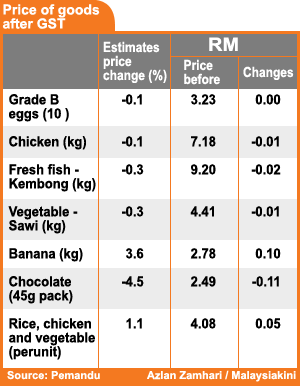By Ong Kian Ming | 12:17PM Oct 27, 2013
Malaysiakini
MP SPEAKS The Barisan Nasional government is trying to mislead the rakyat by giving the impression that the price of most goods and the taxes paid by the consumer will be reduced after the introduction of the goods and services tax (GST) because it will replace two taxes – the sales tax and the service tax (SST) – which the consumer is currently paying for.

What the BN has not told the rakyat is that many items are currently exempt under the sales tax. According to the Sales Tax (Rates of Tax No 2) 2012, the number of items which are exempt under the sales tax i.e. not taxed, runs to 250 pages. In contrast, the number of items which are zero rated under the GST – not taxed at any point of the supply chain – is only 21 pages long.
Some of the items which are not charged under the sales tax but will be charged under the GST include many non-luxury items such as milk, coffee, tea, mineral water, canned fruit, newspapers, stationary, school bags, and boxes, just to name a few. Electricity consumption above 200kwH (any amount above RM50) will also be charged GST.
The prices of these goods will definitely increase after the GST because the removal of the SST has no effect on their prices.
Currently the sales tax is restricted to certain restaurants and professional services provided by accountants, architects, motor vehicle service and repair centres, telecommunication services, security services, estate agents, parking space services operators and service firms.
More services will be charged GST
Under the GST, it is possible that services such as that provided by certain tuition centres and hair saloons will be charged the GST.
The wider coverage under the GST means that more services will be charged the GST compared to the current service tax. This means that the prices of more services will increase.
The BN has also included some items to be tax exempt (as opposed to zero rated) under the GST such as residential properties, financial services, health care and transportation. What this means is that the end product sold is not taxed by the GST.
But the inputs used to produce these goods and services will still be taxed by the GST. For example, residential properties won’t be taxed by the GST but the construction materials used in the building of these residential properties will be covered by the GST.
What this means is that the prices of the goods and services which are tax exempt will also likely rise as a result of the GST.
Ultimately, the argument that the rakyat will be paying less tax under the GST compared to the SST is an empty lie. If this was the case, then why introduce the GST as a revenue raising measure in the first place?
How can the government say that tax collection under the GST will improve and at the same time say that the rakyat will pay less taxes? This is misleading and dishonest.
The truth is that the GST will increase prices of a majority of goods and services even after the removal of the SST and that the financial burden to the rakyat will be increased.
____
ONG KIAN MING is the member of parliament for Serdang.